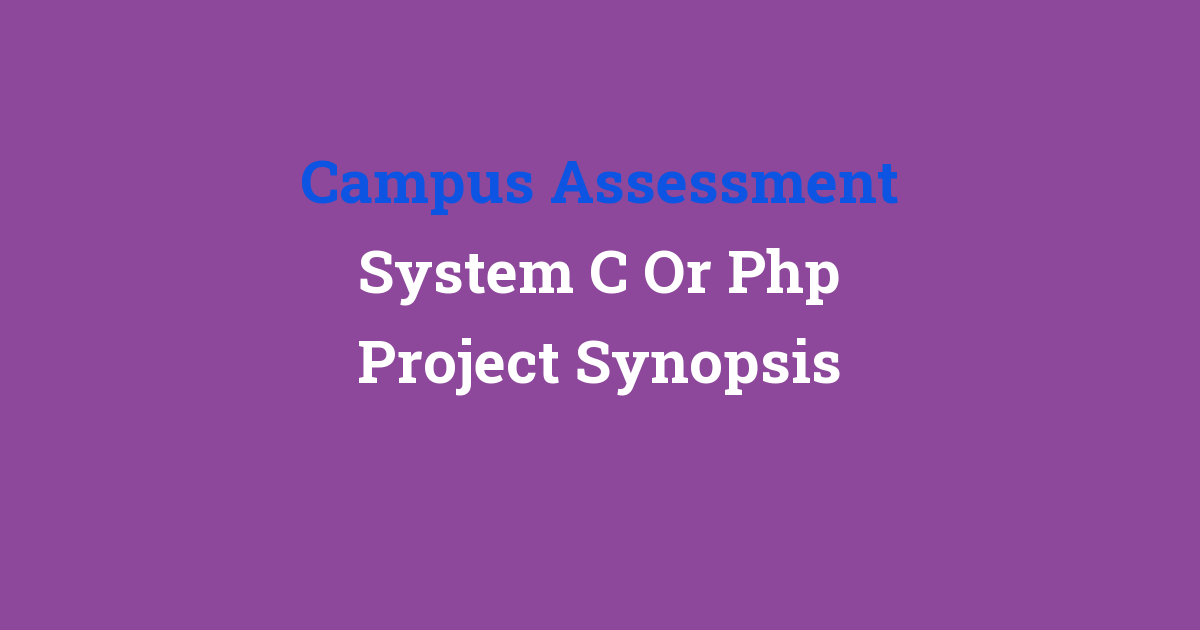Synopsis of the Campus Assessment System project in C or PHP.
Introduction
As a student pursuing a Bachelor of Technology degree in India, one of the key aspects of our academic journey is the assessment system put in place by our educational institutions. The campus assessment system plays a crucial role in evaluating the academic performance of students and providing valuable feedback for improvement.
Problem Statement
However, the existing campus assessment system often faces challenges in terms of efficiency, accuracy, and user-friendliness. The traditional paper-based method of conducting exams and assessments can be time-consuming and prone to errors. Additionally, the manual process of evaluating and recording results can be tedious for faculty members and administrators.
Existing System
The current campus assessment system primarily relies on pen-and-paper exams, where students are required to physically sit for an exam and answer questions on a paper. These answer sheets are then collected, evaluated, and graded manually by faculty members. The results are eventually compiled and recorded in the system for student access.
Disadvantages
While the existing system has served its purpose for many years, it is not without its drawbacks. Some of the key disadvantages of the current campus assessment system include:
- Lack of efficiency: The manual process of conducting exams and grading papers can be time-consuming and labor-intensive.
- Potential for errors: Human error in evaluation and data entry can lead to inaccuracies in student grades.
- Lack of scalability: The traditional paper-based system may not be easily adaptable to accommodate a large number of students and courses.
- Lack of transparency: Students may not have immediate access to their grades and feedback, leading to delays in academic progress.
Proposed System
To address these challenges and improve the campus assessment system, we propose the development of a web-based assessment system using either C or PHP programming languages. This digital platform will streamline the process of conducting exams, grading papers, and recording results, making it more efficient and user-friendly for both students and faculty members.
Advantages
Some of the key advantages of the proposed campus assessment system include:
- Efficiency: The digital platform will automate various aspects of the assessment process, saving time and reducing the potential for errors.
- Accuracy: Automated grading and recording of results will ensure greater accuracy and consistency in student evaluations.
- Scalability: The web-based system can easily accommodate a larger number of students and courses, making it more adaptable to the needs of the institution.
- Transparency: Students will have real-time access to their grades and feedback, enabling them to track their academic progress more effectively.
Features
The proposed campus assessment system will include the following key features:
- Online exams: Students will be able to take exams online through the platform, with the ability to answer questions, submit responses, and receive instant feedback.
- Automated grading: The system will automatically grade exams based on predefined criteria, eliminating the need for manual evaluation.
- Grade recording: Results will be recorded in the system in real-time, allowing students and faculty members to access grades and feedback instantly.
- Analytics: The platform will provide data analytics and insights on student performance, enabling faculty members to identify areas of improvement and track progress over time.
Conclusion
In conclusion, the development of a web-based assessment system using C or PHP programming languages has the potential to revolutionize the campus assessment process and improve the overall academic experience for students and faculty members. By leveraging technology to automate and streamline various aspects of assessments, we can enhance efficiency, accuracy, scalability, and transparency in the evaluation of student performance. This proposed system represents a significant step towards modernizing the assessment practices in educational institutions and ensuring a more seamless and effective learning environment for all stakeholders involved.

